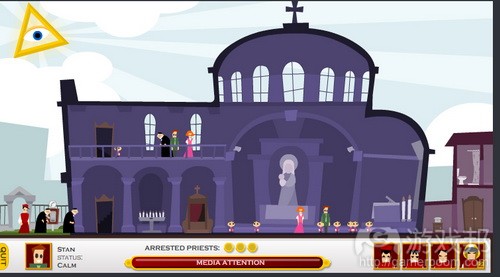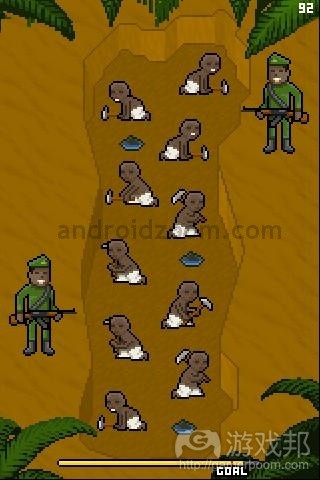《Phone Story》开发者谈苹果的“过度有争议”原则
作者:Leigh Alexander
iPhone的兴起彻底变革现代通讯渠道,游戏开发领域是此范式转移的主要受益者。得益于苹果触屏和App Store,手机游戏开发原本被认为缺乏文化内涵,而如今行业大小工作室均获得平等地位。
这也要归功于设备出现得恰逢时候,恰好盒装内容大幅收缩以及几年前经济出现衰退,这迫使许多开发商开始转向业内更灵活、更平价和低风险内容。自那以后,业内开始涌现生机勃勃的工作室,苹果的必备手机给开发商们带来新希望。
但自今鲜有人愿意审视此发展局面,查看是何种畅销道具令我们面临道德危机。虽然我们已听过富士康自杀事件,工人恶劣工作环境,以及制作这些热门手机所造成的环境问题,但游戏开发商自今依然保持沉默。
挑衅严肃游戏开发商Molleindustria迈出第一步似乎是意料之中。该工作室通过游戏呈现天主教会、麦当劳和石油巨头等强大公司的嘴脸(游戏邦注:如《Operation Pedopriest》、《McDonald’s Video Game》和《Oiligarchy》),其在通过游戏尖锐剖析多数人习为常的社会和经济概念时从不手下留情。
公司最新作品《Phone Story》通过系列迷你游戏和旁白陈述呈现智能手机开发的人类成本和巨大环境影响。在某迷你游戏中,一方面叙述者解说表示多数电子设备均需要矿石,刚果存在矿产资源冲突,巨大需求导致当地出现战争和童工,另一方面玩家须通过触屏指导武装士兵向精疲力尽的童工咆哮,以促使他们按计划完成工作任务。
在另一迷你游戏中,旁白陈述中国电子制造业的自杀现象,以及“防盗网”简单解决方案——而玩家须通过伸缩蹦床接住下坠的工人。
当然《Phone Story》更有趣的地方在于玩家在持有上述设备的同时又与这些信息互动。想象下你参观屠宰场的时候有人招待汉堡包。该开发公司承诺将把游戏所有营收(游戏邦注:就是通常的70% App Store收益),捐献给保护企业员工权益的相关机构(例如,大学师生监察无良企业行动,这是一个主要由大专师生组成的香港民间团体,其声援全球身处恶劣工作环境的工人群体,包括富士康员工)。
或说若《Phone Story》能够入驻App Store,他们的目标便能实现。但游戏正式发行几小时后,苹果就将其移除,称其破坏4条App Store规则:15.2 禁止描述虐童画面和16.1 禁止应用描述“存有异议或粗鲁”内容。另外两条21.1和21.2是针对《Phone Story》慈善宗旨——这似乎不太适用,该规则瞄准的是允许玩家捐款的游戏,而非开发者承诺捐出收益的内容。
Molleindustria让iPhone游戏批评iPhone平台,而苹果选择沉默,这是一个值得玩味的现象。
Molleindustria成员Paolo Pedercini此前接受媒体采访,谈及《Phone Story》,他称游戏构思来自最近刚获得国际事务硕士学位的Michael Pineschi,他曾同Michael Pineschi在创意行动主义组织YesLab交谈过。当时Pedercini已萌生些许奇特构思,项目旨在批判道具盲目崇拜主义。
他回想表示,“其中一个是多点触控虚拟宠物器官,旁白谈及技术崇拜和用户至上主义。遗憾的是,肉体引擎的效果达不到我的期望,所以我就瞄准直接了当的教育游戏。”
但其宗旨也是开发游戏,批判硬件设备行业。Pedercini表示,“西方大多成年人都大概知道,我们的设备是在远方制造,在非常恶劣的环境下诞生。”
“很多关注技术领域的人士都听过富士康自杀事件,电子垃圾问题。但通过《Phone Story》,我希望联系所有这些方面,以更大框架呈现科技层面的消费至上主义现象。”
他特别希望突出“必备”消费电子品文化在维持这些高冲击循环周期方面所坚持的宗旨;《Phone Story》某关卡要求玩家将全新成箱手机扔向蜂拥至门店的买家。在他看来,此营销机制让大家相信他们坚持在升级设备发行当天抢购是导致供应链出现极端的原因所在。
他指出,“我们不希望大家停止购买智能手机。但也许我们可以考虑转变自己的技术追风观念(游戏邦注:从原本的“酷毙了”转变成“也不过如此”的想法)。此现象早前曾出现在皮毛大衣、钻石、香烟和越野车——我认为这种想法也适用于iPad用户。”
Pedercini表示,我们有必要通过设备发起关于此平台的批判。他称,“就像设备自己同用户陈述。此构思旨在实现时刻提醒用户的目的,就像不那么持久的纹身或车位贴,或者某些能够随身携带,甚至成为交谈的切入点的物品。”
但虽然苹果立即移除《Pedercini》造成有趣话题,Pedercini表示他从没想过会出现这种情况:“我非常熟悉App Store政策,游戏的初衷是顺应其规则。”
“若你观察作品指导方针,《Phone Story》并非真的要破坏其中规则,除通用的‘过度有争议和粗鲁内容’,或者也许涉及的‘描述孽待儿童画面’。是的,内容存在黑色幽默和暴力,但其是卡通风格——远比App Store其他作品温和得多。”
Pedercini补充表示,“这些画面之所以令人如此不安是由于玩家将其同现实场景联系起来。当然,其宗旨是将此令人尴尬的丑陋小矮人悄悄插入苹果生态系统,而不是引发抵制情绪。若这只是种挑衅,我会更深一步……若游戏能够面向大众,所涉及话题得到大家的谈论,我会更高兴。”
他苦笑表示,编辑内容时,保证其尽显真实,且不引发争议不是简单任务:“要让新版《Phone Story》避免以粗鲁和争议的方式描绘电子制造供应链中的儿童暴力和虐待现象,这并不是项轻松工作。”
Pedercini表示,“今早一位彬彬有礼的苹果员工致电我谈论《Phone Story》违规问题。当我问道是否能够提交新版本时,他出现一阵沉默,然后回答:‘好的,只要你能确保遵守规则就行。’但事实是你无法把握苹果所谓的‘过度’和‘有争议’标准。”
最令Pedercini担心的是,很多开发者已开始安于手机开发文化的现状。“这里有个问题:开发商社区的全体反应是,‘很难想象《Phone Story》竟通过苹果的审核’,在我看来,这意味着大家普遍接受苹果针对所有开发者的审核制度,这被媒体人士称作‘寒蝉效应’。”
他接着表示,“我确信苹果不会花时间整顿市场,因为开发者已开始自我审查。当然苹果也有权利;大家普遍接受由苹果决定‘应用’文化地位。在他们看来,游戏和应用不是书籍或音乐等文化的组成部分。”
Adds Pedercini:“试着想象下,若他们禁止所有存在‘过度有争议’内容的歌曲,iTunes会有什么反应。”(本文为游戏邦/gamerboom.com编译,如需转载请联系:游戏邦)
Interview: Molleindustria On Phone Story’s ‘Objectionable’ Message
by Leigh Alexander
[Gamasutra talks to Molleindustria about Phone Story, the hardware industry critique that's been pulled from the App Store -- and about the culture of complacency that surrounds mobile game development.]
The rise of the iPhone has revolutionized communication in the modern world, and the game development industry has been one of the largest beneficiaries of this paradigm shift. Thanks to Apple’s touch screen and App Store, mobile game development was dredged from its cultural ghetto to a legitimate avenue for big studios and indies alike.
It arrived in the nick of time, too, after the rapid contraction of packaged goods and the recession of a few years ago forced so many developers to seek more agile, less expensive and lower-risk spaces within the industry. Since then, powerhouse studios have been built and careers have been rescued on the back of Apple’s must-have device.
But until now, few have been willing to turn the lens on this boom and examine what mass-market gadget lust is costing us ethically. Though we’ve since heard of suicides at Foxconn, deplorable working conditions and hazards to the environment involved in the manufacture of the latest hot smartphones, game developers were mostly silent — until now.
It seems natural that provocative serious games developer Molleindustria was the one to take the step. The studio, which has taken on forces like the Catholic church, McDonald’s and big oil with games like Operation Pedopriest, McDonald’s Video Game and Oiligarchy, never pulls its punches as it uses games to sharply deconstruct the social and economic constructs most people take for granted.
Its latest title, Phone Story, uses a series of minigames with voice-over narration to shed light on the human cost and high environmental impact of smartphone development. In one minigame, while the narrator explains that most electronic devices require the mining of coltan, a conflict mineral in Congo whose demand spurs war and child labor, the player must use the touch screen to guide armed soldiers to bark at exhausted child miners in order to meet the goal in time.
In another, the voice-over explains the suicides at electronics manufacturers in China, and the facile solution of “prevention nets” — while the player must catch tumbling workers using a stretched trampoline.
Of course, Phone Story is more interesting for the fact that players must interact with these messages while holding one of the devices discussed. Imagine being served hamburgers on a tour of a slaughterhouse. And all of the developer proceeds — 70 percent of total App Store revenues, as per usual — will be pledged to organizations fighting corporate abuses, starting with Students and Scholars Against Corporate Misbehavior, which supports workers in abusive conditions internationally, including at Foxconn.
Or they would be, if Phone Story had been allowed to stay on the App Store. Apple yanked it just a few hours after the game was officially announced, citing four code violations: 15.2, which prohibits depictions of child abuse, and 16.1, which prohibits apps depicting “objectionable or crude” content. The other two, 21.1 and 21.2, pertain to Phone Story’s charitable bent — and they don’t seem to quite apply, intended instead for games that allow their users to make donations within a game, rather than a pledge by the developer to donate revenues.
Molleindustria makes an iPhone game to criticize the iPhone platform, and that Apple’s chosen to silence it is an interesting punctuation mark on the developer’s statement.
Gamasutra reached out to Molleindustria’s Paolo Pedercini about iPhone Story, who credits the game’s idea to recent international affairs graduate Michael Pineschi, to whom he spoke through creative activism group YesLab. At the time, Pedercini already had some unusual ideas in the works for projects that could act as commentary on gadget fetishism.
“One of them was a multi-touchable virtual-pet vagina, monologuing about technological lust and willful submission to consumerism,” he reflects. “Unfortunately, the flesh engine didn’t work as I hoped so I went for a straightforward educational game.”
But the intent was always to develop a game as commentary on the hardware industry. “Most of the adults in the Western world are somewhat aware that most of our objects are manufactured far away, in conditions that we would consider barbaric,” Pedercini says.
“A lot of tech-aware people heard about the story of the Foxconn suicides or about the issue of electronic waste,” he continues. “But with Phone Story, we wanted to connect all these aspects and present them in the larger frame of technological consumerism.”
He specifically wanted to highlight the goal that “must-have” consumer electronics culture plays in perpetuating these high-impact cycles; one of the levels of Phone Story tasks the players with tossing brand-new boxed phones to swarming would-be buyers rushing a storefront. In his view, the marketing machine that makes people believe they absolutely need an upgraded hardware device on the day it comes out is what causes extremism in the supply chain.
“We don’t want people to stop buying smartphones,” he notes, “but maybe we can make a little contribution in terms of shifting the perception of technological lust from cool to not-that-cool. This happened before with fur coats, diamonds, cigarettes and SUVs — I can’t see why it can’t happen with iPads.”
Pedercini says it was essential to use the platform itself to stage a critique of that platform. “Almost like the device itself was speaking to the user,” he suggests. “The idea was to make a sort of reminder that you can keep with you, like a way-less-permanent tattoo or a bumper sticker, something that you carry around and maybe show off as a conversation-starter.”
But although Apple’s immediate removal of Phone Story makes for an interesting conversation point, Pedercini says he never intended it to happen this way: “I’m very familiar with the App Store policy, and the game is designed to be compliant with it,” he asserts.
“If you check the guidelines, Phone Story doesn’t really violate any rule except for the generic ‘excessively objectionable and crude content’ and maybe the ‘depiction of abuse of children’. Yes, there’s dark humor and violence but it’s cartoonish and stylized – way more mellow than a lot of other games on the App Store.”
“What makes these depictions disturbing is the connection the player makes with the real-world situation,” adds Pedercini. “Of course, the goal was to sneak an embarrassingly ugly gnome into Apple’s walled garden, but not to provoke the rejection. If it was just a matter of provocation I would have gone way further… I’d be much happier if the game was actually available to everybody, and possibly generating discussions around the issues it clumsily addresses.”
Editing the game to make it truthful without being objectionable will be some task: “a new version of Phone Story that depicts the violence and abuse of children involved in the electronic manufacturing supply chain in a non-crude and non-objectionable way… will be a difficult task,” he notes wryly.
“This morning, a dry and polite Apple employee called me personally to talk about the specific violations of Phone Story,” says Pedercini. “When I asked if I can submit a new version, there was a moment of silence and then he answered, ‘Yes, if you can make it compliant to the guidelines.’ But the truth is that there is no way to know what’s ‘excessive’ and ‘objectionable’ in Cupertino.”
Most alarming to Pedercini is how complacent so many developers have become to mobile development’s culture. “Here’s the problem: the unanimous reaction from developers community has been, ‘Wow, it’s incredible Phone Story made through Apple’s review process,’” he says. “To me, this signals a full acceptance of a regime of censorship, the equivalent, for developers, of what journalists call the ‘chilling effect.’”
“I’m sure that Apple doesn’t spend that much time in policing its marketplace, because the developers are already censoring themselves.” he continues. “Of course, Apple has the right; it is the acceptance of Apple view about the cultural status of the ‘App.’ For them, games and applications are not part of culture like books or music.”
Adds Pedercini: “Try to imagine what kind of reaction iTunes would provoke if they banned all the songs with ‘excessive objectionable’ content.”(Source:gamasutra)










































 闽公网安备35020302001549号
闽公网安备35020302001549号